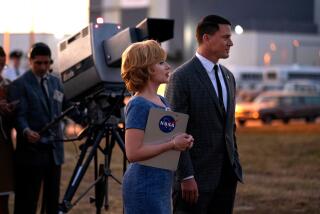Opinion: Why ‘Interstellar’ is good for America’s image
- Share via
Christopher Nolan’s “Interstellar” fell to Earth at the domestic box office over the weekend, but its international ticket sales are rocketing through the stratosphere faster than commentators can rehash space-based idioms to describe its out-of-this-world success.
Meanwhile, critics, scientists, and audiences around the world are debating the film’s artistic and scientific merit, but all seem to be in general agreement that it is a work of extraordinary spectacle.
For all its technical virtuosity, however, one of the film’s most significant images is also one of its simplest: an American flag.
I won’t give anything away, but suffice it to say that the titular interstellar crew has the fate of humanity in their hands, and they are not in the employ of a faceless multinational corporation or a feel-good international coalition. They’re working for the United States government, specifically NASA, and when they land on faraway planets, they carry with them the stars and stripes.
That may seem like a trivial detail, but it’s hard to overstate how important that kind of iconography is in the international arena: Scholarly research overwhelmingly demonstrates that American entertainment exports are essential to the country’s public diplomacy, fundamentally framing international impressions of the U.S. American culture inspired young people behind the Iron Curtain during the Cold War a generation ago, and it continues to help bring countries into the American sphere of influence today -- even as geopolitical events rattle our global image.
Still, as omnipresent as American entertainment is, in the 21st century it rarely carries an overtly positive message about the country itself. The heroes are almost always American, of course, but even a Hollywood blockbuster with unequivocal political aspirations like “Captain America: The Winter Soldier” is ambiguous enough with its messaging to allow for wildly varied political interpretations. That’s totally fine; nobody likes transparent propaganda, and analyzing the ambiguities of a quality film is one of the great thrills of being an audience member.
But at a time when audiences around the world understand American culture to be about little more than violence and sex, it matters when a movie plainly states that American ingenuity can save the world.
The film doesn’t say so in a remotely jingoistic way; doing so would destroy its universality and core message of humanistic triumphalism. But putting NASA and the American flag against a backdrop of limitless human potential is powerful in its own right, especially in a film where every shot and line of dialogue is brimming with authorial intent. And while planting an American flag on extraterrestrial soil is, of course, meant to evoke memories of the lunar landings, it also elicits a sense of forward-looking nostalgia, a warm recollection of what the American flag once meant and what it may one day mean again.
Consciously or subconsciously, that symbology will likely stick with the film’s audience at home and abroad for years to come. As such, Nolan -- the son of a British father and American mother -- has given the United States a gift that can only be described as, well, stellar.
Joel Silberman is a Los Angeles-based writer and the producer of such viral web videos as “Legitimate Rape” Pharmaceutical Ad (TW) and Kids Do The News. Follow him on Twitter @Wordpeggio
Follow the Opinion section on Twitter @latimesopinion
More to Read
A cure for the common opinion
Get thought-provoking perspectives with our weekly newsletter.
You may occasionally receive promotional content from the Los Angeles Times.









